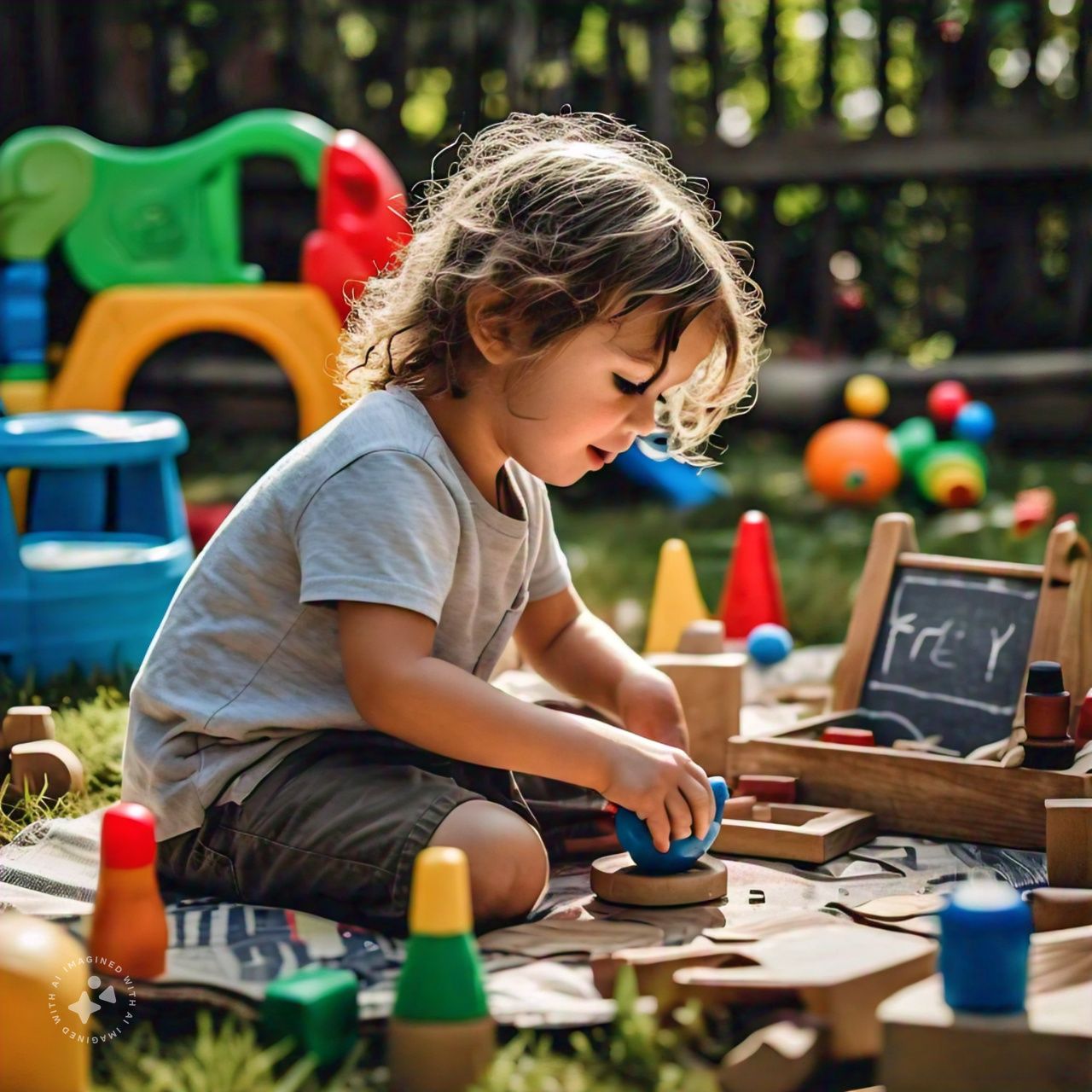Introduction:
In an age where structured activities and academic performance dominate a child’s day, unstructured playtime often takes a back seat. However, experts agree that unstructured play is crucial for the holistic development of children. This form of play allows children to engage in self-directed activities, encouraging creativity, problem-solving, and emotional growth. At DWPS, the Top Rated playschool in greater noida where parents and educators increasingly recognize the significance of play, it’s essential to understand why unstructured playtime is a vital component of child development.
Understanding Unstructured Play
Unstructured play, also known as free play, refers to activities that are not guided by rules or adult supervision. It is spontaneous, self-motivated, and driven by a child’s imagination. Unlike structured play, where activities follow a predetermined set of instructions, unstructured play is open-ended, allowing children to explore and interact with their environment in creative and dynamic ways.
This type of play can include activities such as building forts, playing pretend, or simply running around in the backyard. While it may seem like simple fun, unstructured play is a powerful tool for cognitive, social, and emotional development.
Cognitive Benefits of Unstructured Play
Free play is an essential part of cognitive development as it promotes critical thinking and problem-solving skills. When children engage in unstructured play, they are forced to come up with solutions to problems on their own. Whether it’s figuring out how to build a tower of blocks or navigating social dynamics during a game of tag, children learn to think critically and make decisions.
Unstructured play also encourages creativity and imagination. During playtime, children create their own worlds, characters, and scenarios, which fosters innovation and original thinking. This creative process is a cornerstone of cognitive development, helping children improve their ability to think abstractly and approach problems from different angles.
Moreover, unstructured play contributes to language development. As children interact with their peers during play, they engage in conversations, negotiate rules, and express their ideas. These interactions promote vocabulary expansion and communication skills, which are vital for academic success.
Social and Emotional Development through Play
In addition to cognitive benefits, unstructured play significantly impacts social and emotional growth. Play is a natural way for children to learn social norms, develop empathy, and build relationships with their peers. Through play, children experiment with different social roles and learn how to navigate complex interpersonal dynamics.
For example, when children play together, they learn to share, take turns, and cooperate with others. They also develop conflict resolution skills as they negotiate rules and settle disagreements. These experiences teach children how to empathize with others, understand different perspectives, and develop emotional intelligence.
Unstructured play also helps children manage their emotions. In a free play setting, children have the autonomy to express themselves and release pent-up energy, which is important for emotional regulation. This self-expression helps children process their feelings, reduce stress, and build emotional resilience.
Physical Development and Play
Physical play is an essential part of unstructured playtime, contributing to a child’s overall health and development. Activities like running, climbing, and jumping not only help children burn off energy but also promote the development of motor skills. Gross motor activities such as running and hopping improve muscle strength, coordination, and balance, while fine motor activities like building with blocks enhance hand-eye coordination and dexterity.
Physical play also encourages healthy habits. When children engage in physical activities during free play, they learn to associate exercise with fun and enjoyment, which can lead to lifelong fitness habits. Regular physical play also reduces the risk of childhood obesity and related health issues, promoting overall well-being.
Fostering Independence and Confidence
One of the most significant benefits of unstructured play is the development of independence and self-confidence. During free play, children are in control of their activities, allowing them to make decisions, solve problems, and take risks. This autonomy fosters a sense of independence and helps children develop a strong sense of self.
When children succeed in overcoming challenges during play—whether it’s mastering a new game or building a complex structure—they experience a sense of accomplishment. These small victories build self-confidence and reinforce a growth mindset, teaching children that they are capable of achieving their goals through perseverance and effort.
Furthermore, unstructured play allows children to take on different roles, experiment with leadership, and develop a sense of responsibility. Whether they are leading a group of friends in a pretend adventure or organizing a game, these experiences empower children to take initiative and develop leadership skills.
The Role of Parents and Educators in Encouraging Unstructured Play
While unstructured play is child-driven, parents and educators play a crucial role in providing the time, space, and resources for free play to occur. In a world where schedules are often packed with academic and extracurricular activities, it’s important to prioritize playtime.
Parents can encourage unstructured play by creating a play-friendly environment at home. This doesn’t require expensive toys or elaborate setups; instead, offering simple items like building blocks, art supplies, or outdoor space can spark creativity and imagination. Parents should also resist the urge to over-schedule their children’s days, allowing time for spontaneous, self-directed play.
Educators, too, have a role in promoting unstructured play within the school setting. Playtime should not be seen as a break from learning but rather an integral part of the educational process. Schools can provide designated play areas and allocate time for free play during the school day. Encouraging outdoor play during recess, as well as incorporating play-based learning into the curriculum, can enhance student engagement and promote holistic development.
Balancing Structured Activities with Free Play
While structured activities like sports, music lessons, and academic clubs offer valuable learning experiences, they should be balanced with unstructured play. Over-scheduling children with structured activities can lead to stress, burnout, and a lack of creativity. Free play provides a much-needed break from the pressures of structured environments, allowing children to relax, recharge, and explore their interests.
It’s important to recognize that structured and unstructured activities complement each other. Structured activities teach discipline, focus, and specific skills, while unstructured play nurtures creativity, autonomy, and emotional resilience. A balanced approach allows children to reap the benefits of both, supporting their overall development.
The Impact of Technology on Unstructured Play
In the digital age, technology has become a dominant force in children’s lives, often encroaching on time for unstructured play. While technology can offer educational benefits, excessive screen time can limit opportunities for imaginative and physical play. As children spend more time on screens, they may miss out on the critical benefits of outdoor play and face-to-face social interactions.
To strike a healthy balance, parents and educators should set boundaries on screen time and encourage activities that promote creativity and physical movement. Outdoor play, in particular, offers unique benefits that cannot be replicated by digital devices. Nature provides a rich, ever-changing environment for exploration, problem-solving, and physical activity, all of which are essential for development.
Play and Lifelong Skills
The benefits of unstructured play extend far beyond childhood. The skills children develop during free play—creativity, problem-solving, emotional regulation, and social interaction—are the same skills that will serve them well in adulthood. Resilience, adaptability, and the ability to collaborate with others are qualities that are highly valued in today’s workforce and society.
Play also fosters a love for learning that extends into adulthood. When children are given the freedom to explore their interests and engage in activities that bring them joy, they develop a passion for discovery and innovation. This intrinsic motivation to learn and grow continues into later life, making play an essential foundation for lifelong success.
Addressing Common Concerns about Unstructured Play
Despite its many benefits, some parents may worry that unstructured play is unproductive or a waste of time. However, research shows that play is far from frivolous—it is a critical component of a child’s development. Play stimulates cognitive growth, strengthens social bonds, and promotes emotional well-being.
Another concern is safety, especially when it comes to outdoor play. While it’s natural for parents to want to protect their children, overprotection can hinder the development of independence and problem-solving skills. Supervised play in safe environments allows children to take manageable risks and learn important life lessons without compromising their safety.
The Future of Play in Education
As the importance of play becomes more widely recognized, educators are rethinking the role of play in the classroom. Play-based learning, where play is integrated into academic lessons, is gaining traction as an effective way to engage students and promote a deeper understanding of concepts. For example, using games and hands-on activities to teach math or science can make abstract concepts more tangible and relatable for young learners.
In addition to academic benefits, play-based learning fosters a love for learning by making education enjoyable and interactive. By integrating play into the curriculum, schools can create a more holistic and engaging learning environment that supports both academic and emotional development.
Conclusion: Play as a Cornerstone of Development
At DWPS, the Top Rated primary school in Greater Noida where unstructured play is not merely a way for children to pass the time—it is a powerful tool for cognitive, social, emotional, and physical development. In a world that increasingly values structure and productivity, it’s essential to remember that play is a fundamental part of growing up.
By providing children with the time and space to engage in unstructured play, we are giving them the opportunity to develop critical life skills that will serve them well into adulthood. Play fosters creativity, builds resilience, strengthens social bonds, and nurtures a love for learning. As parents and educators, it’s our responsibility to champion the power of play and ensure that it remains an essential part of every child’s development journey.

